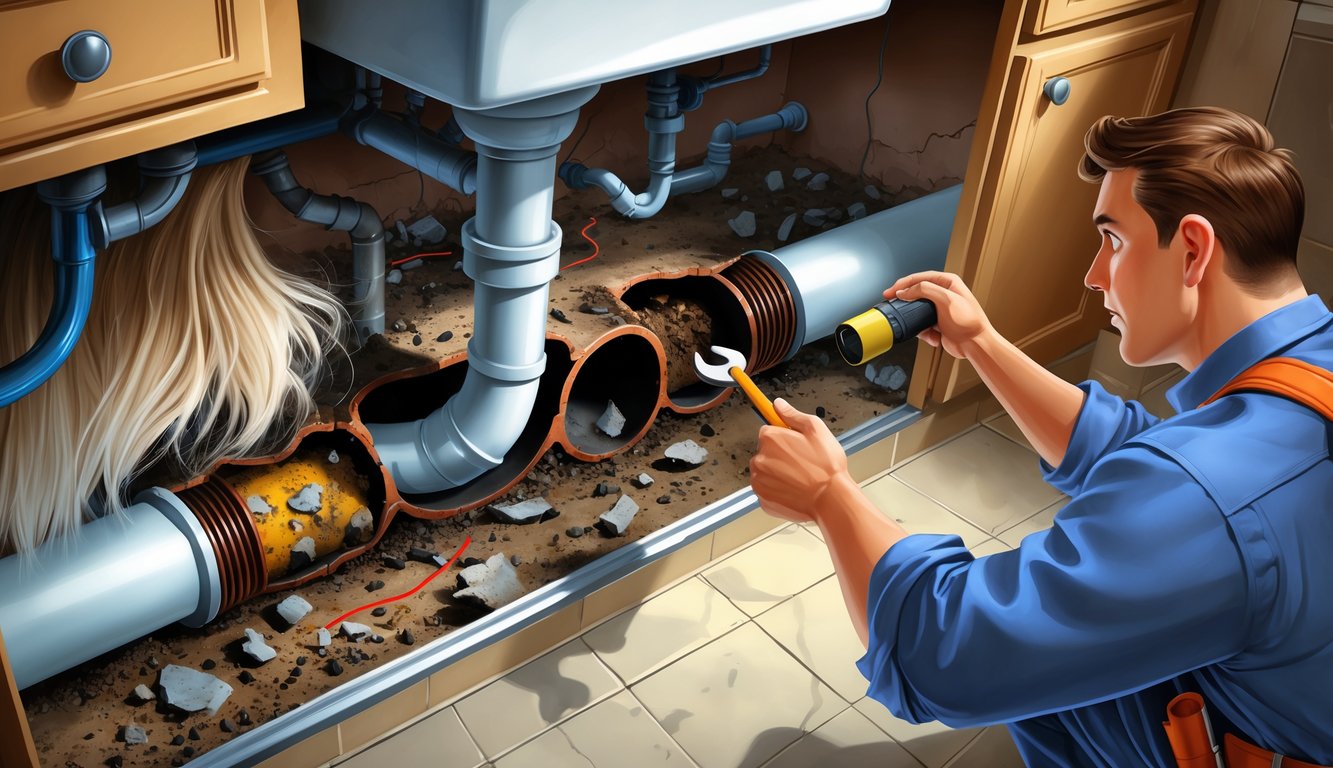
When Persistent Clogs Point to Bigger Plumbing Concerns
If you’re plunging the same drain for the third time this month, something’s up. My neighbor just lives with water backing up for weeks. I can’t do it. Sometimes it’s not even about the clog, it’s about pipes falling apart behind the scenes.
Recognizing the Signs for Urgent Intervention
Why does my kitchen sink gurgle when the dishwasher runs? That’s not normal. Plumbers say repeated clogs usually mean deeper problems—old pipes rotting, maybe the house settling weirdly. One slow drain? Whatever. But if it’s always the same spot, and you get weird smells or stains, that’s a red flag. Cactus Plumbing & Air says underground lines can collapse before you see a drop of water. Gurgling, stains, tree roots—nobody thinks about it until the whole street reeks.
The Value of a Thorough Plumbing Inspection
I only stopped hating inspections after my friend punched a hole in his own drain with a snake. A real plumber shows up with a camera and finds all the gross stuff hiding behind your walls. Home Contractors says old houses (pre-1980s) have pipes that just… vanish. I watched a plumber pull out a section that was basically missing. No chemical cleaner beats a camera and hydro-jet. Expensive, but less painful than a 2 a.m. flood.
Frequently Asked Questions
The worst part? It’s never just water and hair. My plumber friend rolls his eyes every time I say I plunged twice in a week. Sometimes the toilet gurgles like it’s trying to warn me. If pipes could talk, I’d probably move out.
What are some surprising signs that indicate serious plumbing issues?
I keep smelling sewer gas after running the dishwasher. Is that normal? No idea. Pros say a slow “glug” means something’s off. Stains on the ceiling aren’t just humidity. Low water pressure? That’s a leak waiting to happen.
Gurgling, chirping pipes, damp spots under the sink—none of it’s “quirky.” Plumbers say most people ignore these until a pipe bursts, but I still want to believe it’s old house charm.
How can recurrent drain clogs hint at bigger plumbing problems?
Pouring enzyme cleaner down the tub twice a year isn’t “maintenance.” If you’re unclogging the same drain every few months, your house is begging for help. Plumbers say frequent backups mean old, misaligned pipes or roots. Water pooling in the yard? Not a landscaping feature.
Sometimes I blame ghosts, but Veterans Plumbing says it’s just hardware failure or a collapsed line. I still keep plunging. Why? No clue.
Can ignoring minor clogs lead to critical plumbing system failures?
Plumbers laugh when I say, “It’s just water and a little hair.” Small clogs turn into corrosion or sewer backups, then the repairs cost more than my car. Water damage from a drip under the sink? Half the country’s had it. Nobody expects mushrooms under the kitchen floor until it’s too late.
There’s always one neighbor who claims his pipes “heal themselves.” He’s just lucky. For now.
Why should homeowners be cautious about DIY methods to unclog drains?
Every time I see a “biodegradable snake” ad, I remember the horror stories—plastic stuck deeper, chemicals eating through pipes. Cactus Plumbing warns that a quick fix can destroy seals, flood your house, or break your lease. DIY is tempting, but “miracle solutions” usually just move the clog or make it worse.
My best friend’s dad dumped gallons of vinegar and baking soda down the shower. Plumber said, “Congrats, now your clog foams.”
What are the potential risks of overlooking small clogs in plumbing systems?
Alright, so here’s the thing: I keep telling myself tiny clogs are nothing, but then—out of nowhere—they’re suddenly the cause of leaks, soggy drywall, mold popping up in weird places, and, oh, awesome, now there’s a parade of bugs. Why do stagnant puddles attract every creepy-crawly in the zip code? Nobody warns you about drywall turning into Swiss cheese because you “meant to get to it.” Six weeks of a drip and suddenly the wood’s all soft and black—how is that even possible? Honestly, it’s like the universe is just waiting for me to ignore a slow drain.
And, full disclosure, I still skip those dumb drain screens half the time. Even after watching cabinet bottoms warp and realizing the plumber’s invoice is almost as much as a flight to Hawaii. I mean, look at this. Am I learning? Maybe. Maybe not.
How often should professional plumbers inspect our home drainage system?
Honestly, who even thinks about this stuff until the basement smells like swamp? I keep seeing “annual inspection” tossed around—maybe some trade association said that, maybe it’s just plumbers trying to stay busy, who knows. I guess once a year is the gold standard, or whenever there’s a freak storm and you’re suddenly picturing tree roots crawling through your pipes like something out of a horror movie. Whatever. I do know that if the plumber shows up without a camera scope, I’m not letting them near my walls. What are they going to do, just listen really hard?
My neighbor actually did the whole seasonal inspection thing last year. He thought everything was fine—then boom, hidden crack, total repiping, chaos. Makes you wonder if there’s a subscription box for “your pipes are about to ruin your week.” There should be.